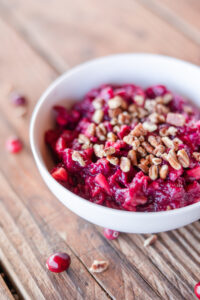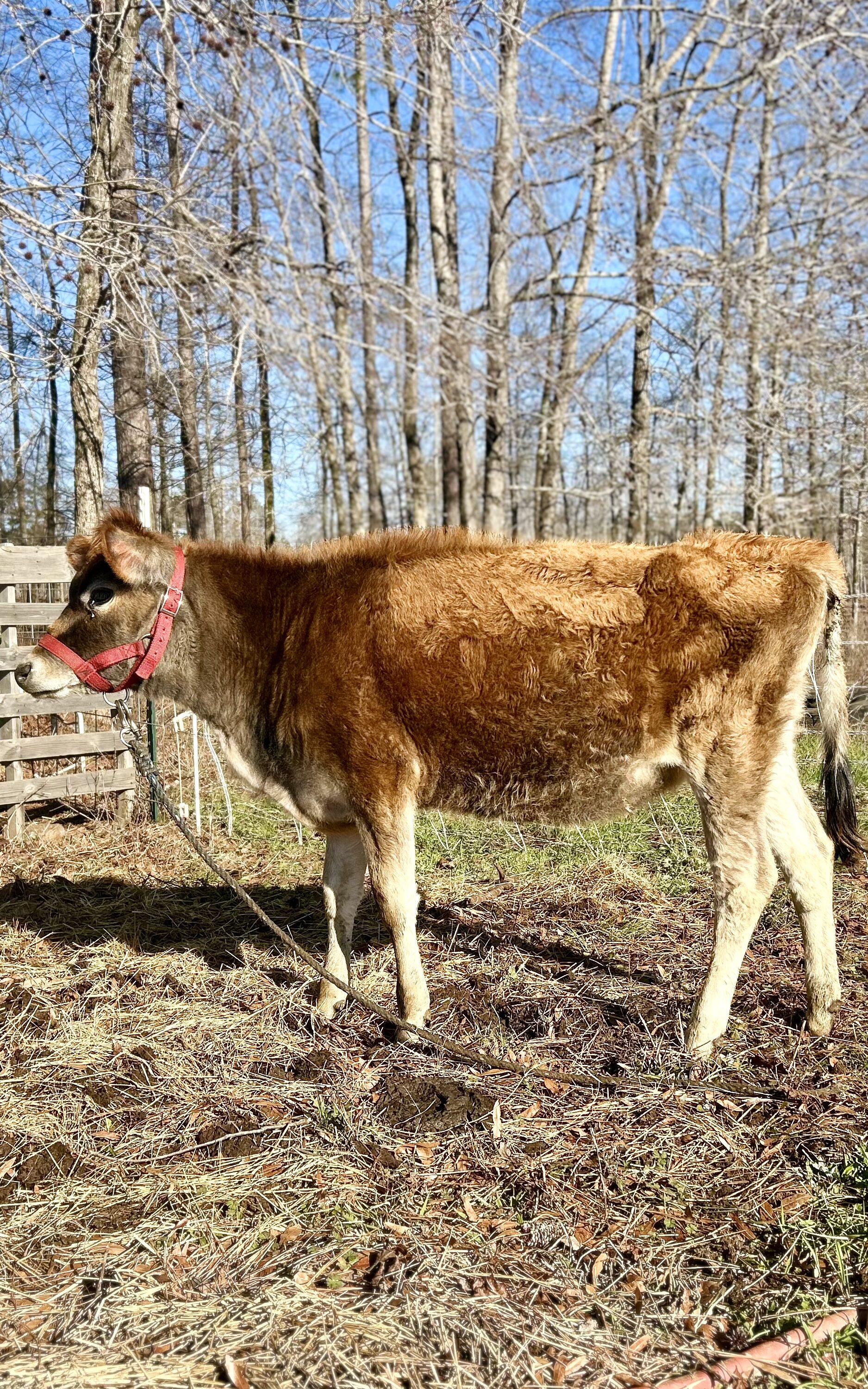Pickled Beets are easy to make and come together quickly with a simple brine consisting of vinegar, water and salt. No canning required!
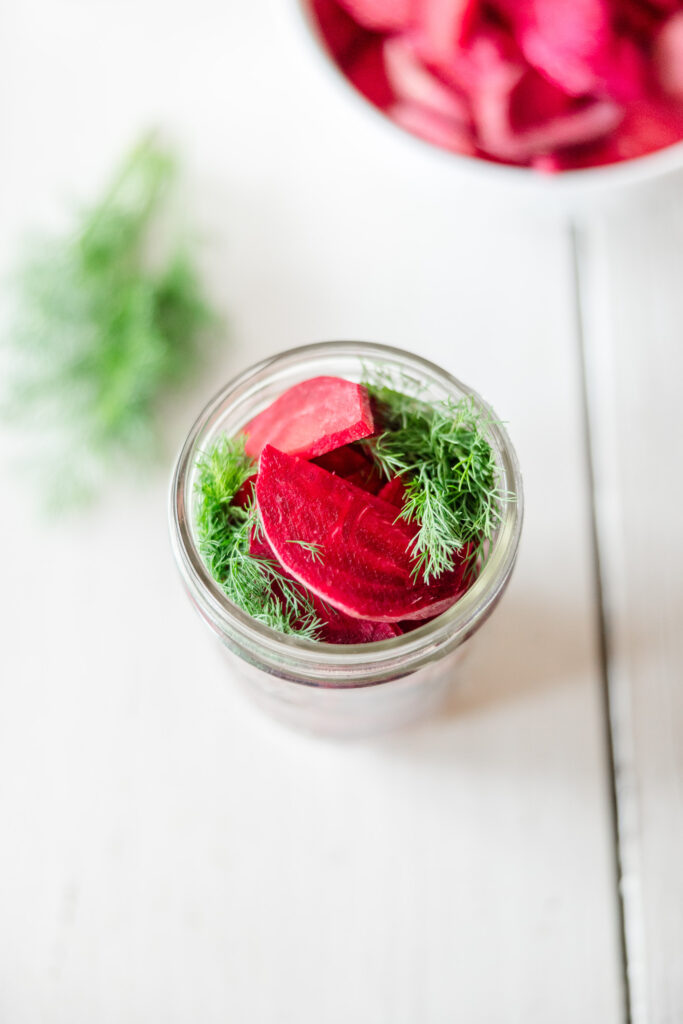
This was the first year that I discovered the incredible joy of beets! We grew them in our garden, and once harvested, began experimenting with the best ways to enjoy them.
Lately I have been in a pickle craze. If its a vegetable (and even if it’s not), I am adventurous and try it pickled. Pickled okra, pickled carrots, pickled squash. You name it, and it’s been made! So when the abundance of beets began pouring in, I knew I had to try pickled beets.
Beets are naturally earthy and crisp. The tartness of the vinegar helps to neutralize the earthiness and rounds out the beets nicely. We very soon discovered after making Pickled Beets that it’s our favorite way to consume this red root vegetable. Don’t believe me? Try it for yourself! You won’t believe how simple and easy it is to make pickled beets!
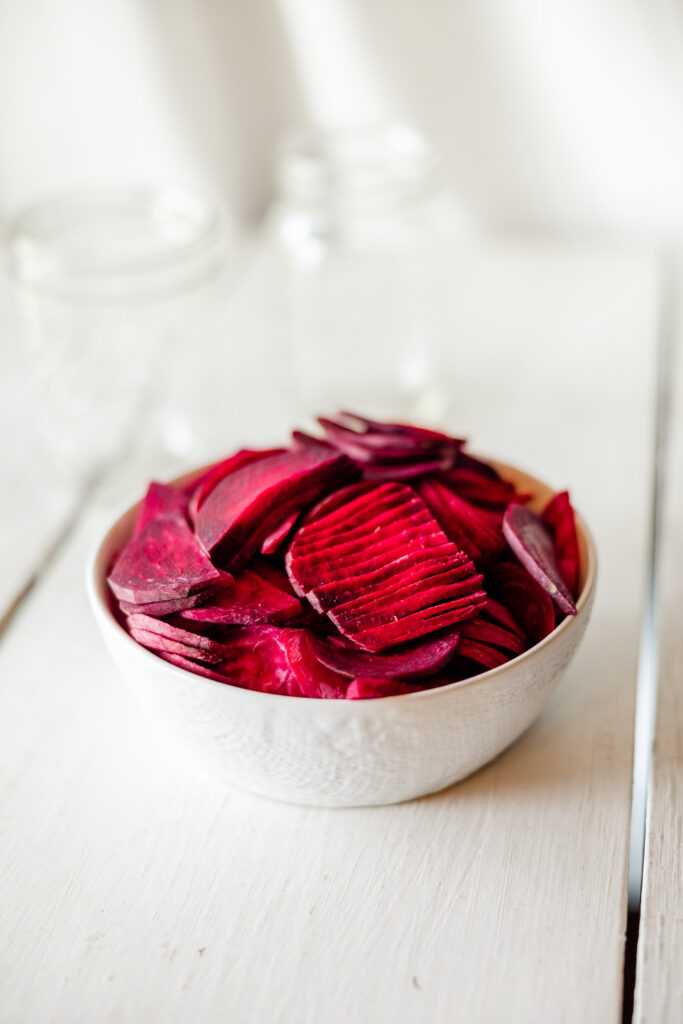
What You’ll Need
- BEETS – I use red beets, harvested fresh from our garden. Peeling removes unwanted toughness and exposes the inside to the pickling brine. This step isn’t required but is recommended for best results!
- WATER – Filtered and non-chlorinated is best!
- WHITE VINEGAR – I love using white vinegar for my pickles, but Apple Cider Vinegar will work too!
- SALT – I use Himalayan Salt, but Kosher salt is also a good choice.
- GARLIC – This is optional but adds an incredible flavor and additional health benefits! 1-2 cloves per jar will work.
- DILL – In order for a pickle to taste like a pickle, I add fresh dill to my jars! I love being able to step out into our herb garden and harvest fresh dill for my pickles, but dried dill works well too.
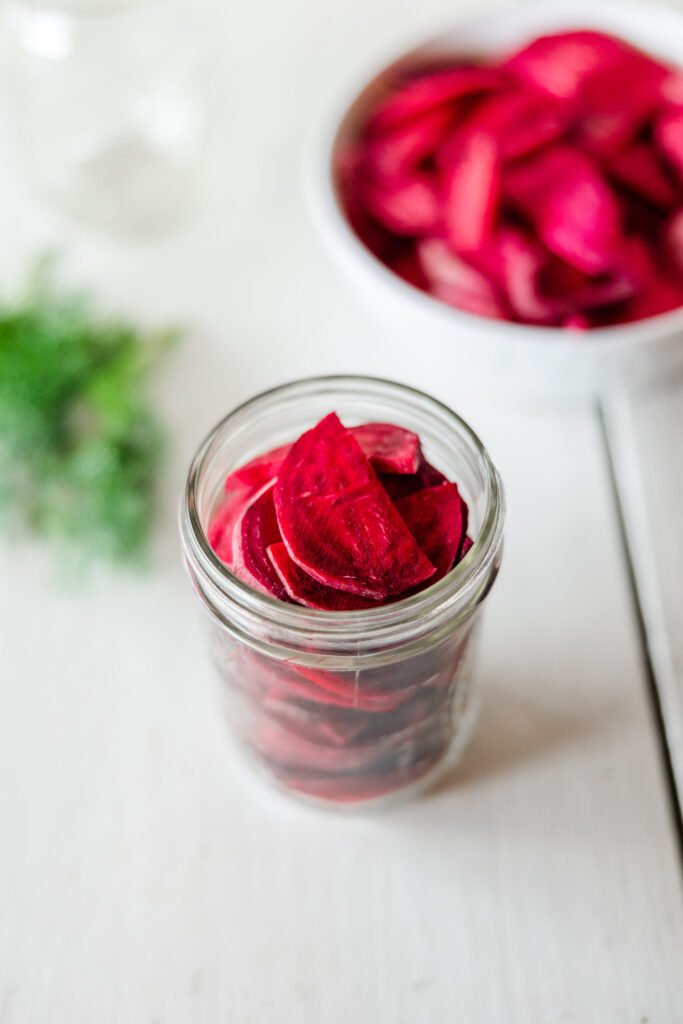
Do I Need to Blanch or Boil My Beets?
There’s a reason that this recipe is called Simple and Easy Pickled Beets. I didn’t want to include any cumbersome or unnecessary steps. Simple and Easy really does mean that! I like to peel my beets using a vegetable peeler or knife and slice them finely. This allows the pickling brine to penetrate each wedge. Cooking beforehand is not necessary! I just throw all of my beet slices in pint jars and cover them with hot brine. Skipping the cooking step also ensures that the pickled beets stay firm and crisp.
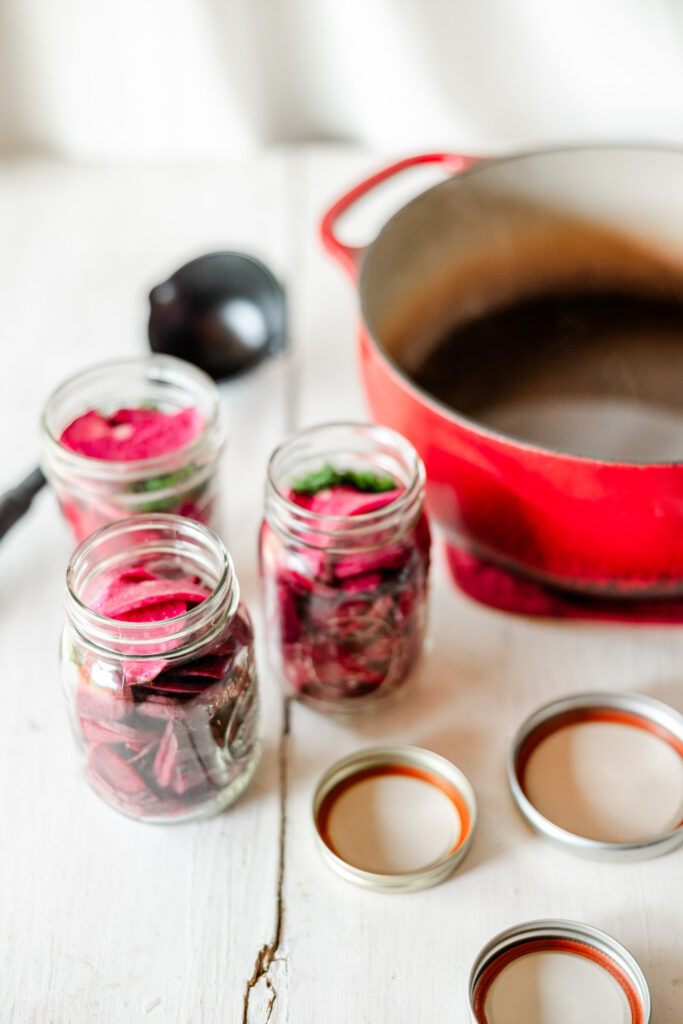
How to Make Refrigerator Pickles
I used to be intimidated by the pickling process. Do I need to sterilize my jars? What makes a good brine? Why do some recipes call for sugar and others do not? When I was introduced to refrigerator pickles, my pickling anxiety was put at ease. Suddenly the worry that I might mess things up was replaced with a love of pickling. I began pickling everything I could get my hands on, and my taste buds thanked me heartily!
Refrigerator pickles do not require canning. This is one reason why I love them so much! Refrigerator pickles call for vegetables and a simple brine. No boiling, blanching, cooking or agonizing allowed. 😉
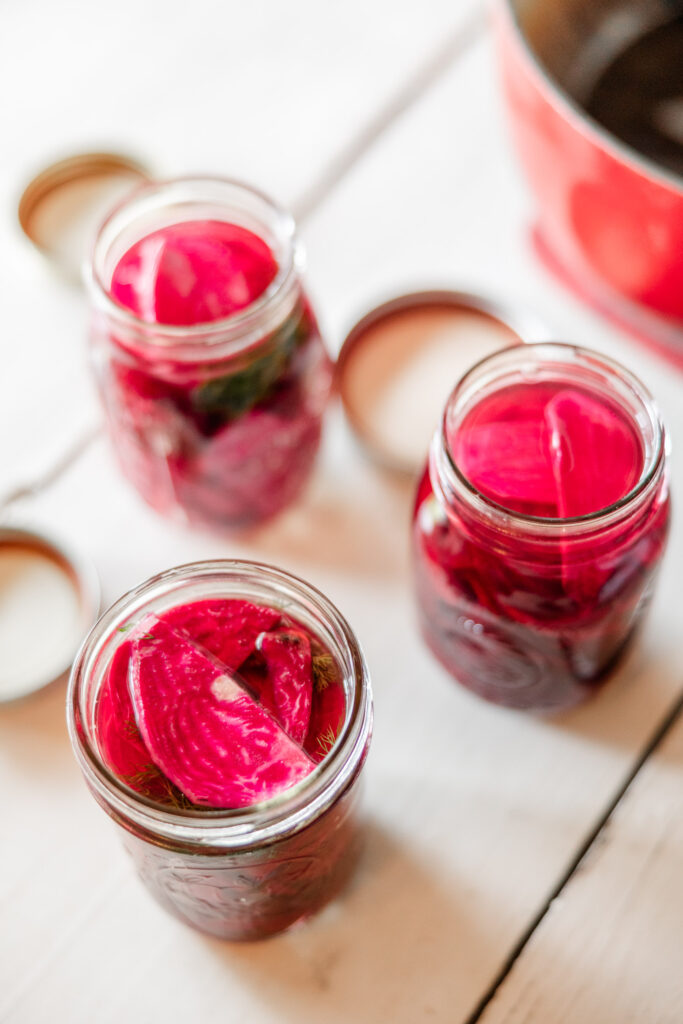
Preparing Your Beets
I thinly slice my beets and cut them in half to make sure they pack easily into pint jars. Slices that are too thick will not be as “pickly.” There’s no magic to slicing beets. Experiment, make different shapes, and have fun with it!
How to Make Brine
To make a simple brine, combine salt, vinegar and water. For this pickle recipe, I boil the liquids and salt together to make sure it dissolves evenly. Pouring hot instead of cold brine over the vegetables acts as a natural tenderizer, while still allowing the beets to retain crispness.
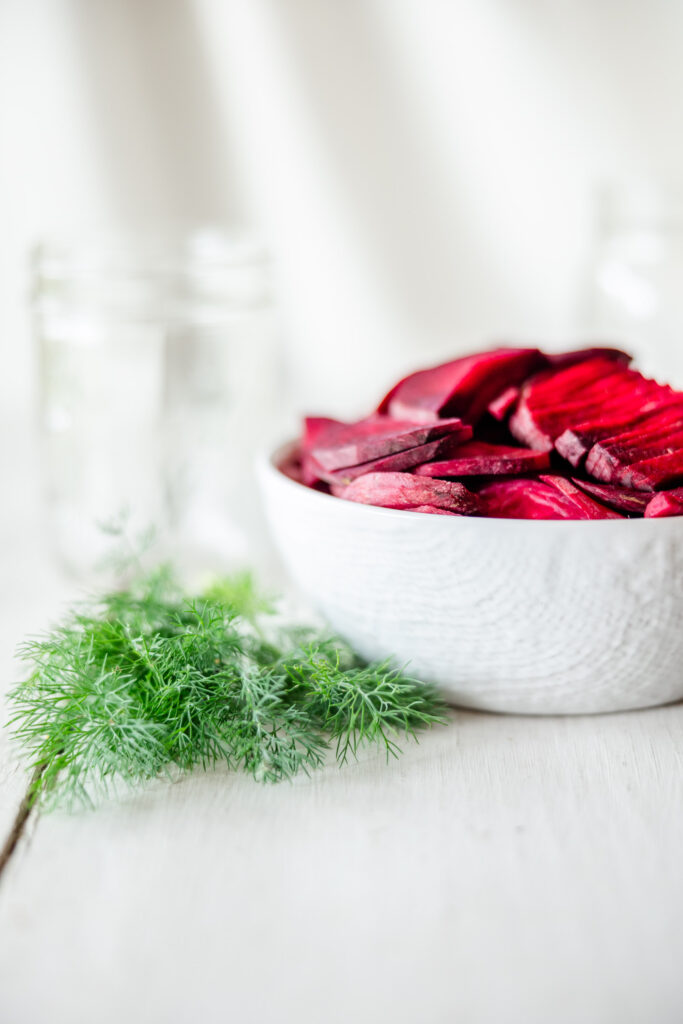
How Long Do Pickled Beets Last?
Honestly I have never worried about eating up our pickles in time! We love them so much that we can hardly keep them on the refrigerator shelves. But if you want to stretch out your supply, they will last a few weeks in the refrigerator. Want them to last all season long? Can jars by processing according to pickling instructions, and enjoy them all winter!
Should Pickled Beets Chill before Serving?
Pickled Beets will be the most flavorful after a full 24 hours. There have been times that I get impatient and consume them only a couple of hours after pickling. However, for optimal flavor, serve after a full day of chilling.
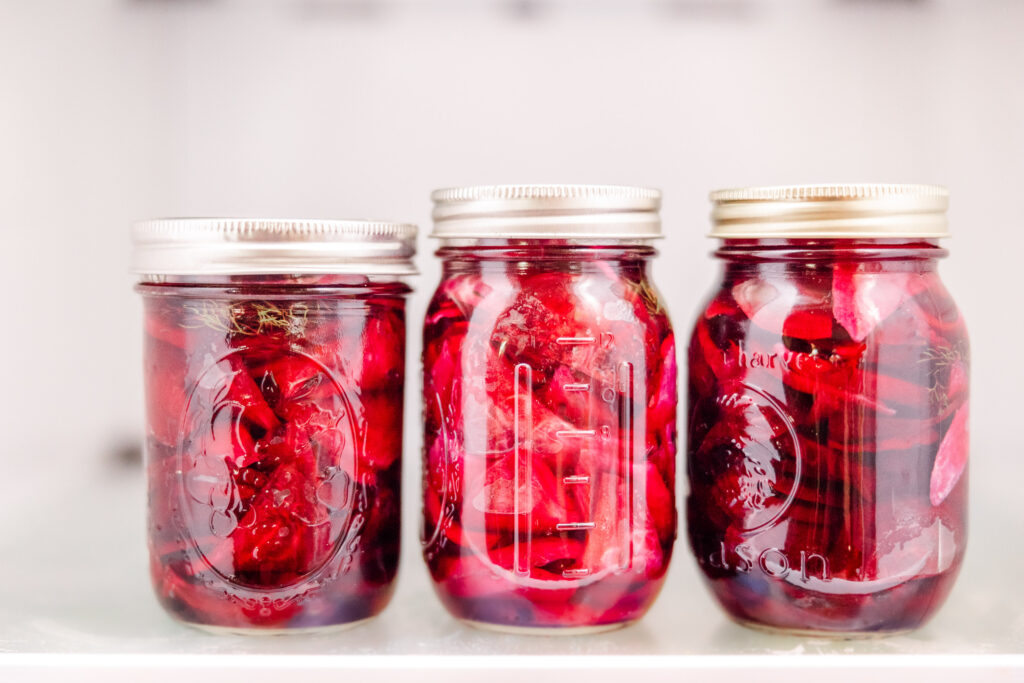
In conclusion, pickled beets are the perfect addition to taco salad, summer picnics, or if we’re being honest, eating straight out of the jar! Above all that’s my favorite way to enjoy pickled beets. 🙂
Simple and Easy Pickled Beets (No Canning Method)
Course: SidesCuisine: AmericanDifficulty: Easy3
Pints20
minutesPickled Beets are easy to make and come together quickly with a simple brine consisting of vinegar, water and salt. No canning required!
Ingredients
7 Medium Beets
2 Cups White Vinegar
2 Cups Water
2 Tablespoons Himalayan or Kosher Salt
6 Garlic Cloves (optional)
3 Tablespoons Fresh Dill (optional)
Directions
- Peel beets with a vegetable peeler or knife until outer skin is removed. Cut beets in half, and thinly slice.
- Pack three pint jars with sliced beets. Add 2 garlic cloves and 1 Tablespoon of fresh dill to each jar, if using.
- In a medium saucepan, combine vinegar, water and salt. Bring to a boil until salt dissolves. Remove from heat, and pour hot brine over prepared jars. Using a thin spatula, rub down the inside of the jar to release air bubbles.
- Cap jars with lids and refrigerate for 24 hours.
- Serve and enjoy. Refrigerate any leftover pickles for up to six weeks.
Notes
- Pickled Beets will be the most flavorful after a full 24 hours. There have been times that I get impatient and consume them only a couple of hours after pickling. However, for optimal flavor, serve after a full day of chilling.
I hope that you will soon see how simple and easy it can be to pickle vegetables! Not to mention they are incredibly tasty, and the perfect way to preserve the harvest all summer long. Pickled Beets have become a household favorite and are hands down our favorite way to enjoy this red root vegetable! Pickles are very flexible and can be spiced up for more variety. Try adding different herbs like basil, garlic or mustard seed. Get creative and experiment with new flavor combinations. You can’t go wrong, and you may just discover a new family favorite that will be passed on to the next generation! Pickles are also very forgiving so be encouraged that you can’t mess them up.
Joyfully,
Lauren
Did you make this recipe? Tag us on Instagram, or leave us a comment below!



